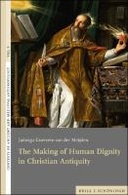Explore

The Making of Human Dignity in Christian Antiquity
0 Ungluers have
Faved this Work
Login to Fave
The book examines the late ancient history of one pivotal concept of contemporary culture, that of human dignity, with the view to identifying the moment in history when European culture worked out a systematic category for human axiological status. Whereas some studies concentrate on the notion of dignity in the Renaissance, suggesting that the earlier Christian thought emphasized human insignificance, this analysis reveals that it was the patristic writers who undertook the decisive rethinking of human dignity, primarily in light of the incarnation and the introduction of the feast of Christmas. The volume traces the transformation of the culturally prevalent ancient maxim of self-knowledge (“know thyself”) into an axiological appeal (“know thy dignity”) claiming that it was within that tradition that “dignitas hominis” was popularized and entered the European mindset. In order to demonstrate the lasting changes, the volume outlines patristic axiology’s reception in the Middle Ages.
This book is included in DOAB.
Why read this book? Have your say.
You must be logged in to comment.
Rights Information
Are you the author or publisher of this work? If so, you can claim it as yours by registering as an Unglue.it rights holder.Downloads
This work has been downloaded 38 times via unglue.it ebook links.
- 38 - pdf (CC BY-NC-ND) at Unglue.it.
Keywords
- dignitas hominis
- early medieval anthropology
- European culture
- gnothi seauton
- Human Dignity
- image of god
- know thyself
- microcosm
- patristic anthropology
- thema EDItEUR::C Language and Linguistics::CF Linguistics::CFZ Sign languages, Braille and other linguistic communication
Links
DOI: 10.30965/9783657796700Editions

